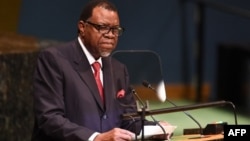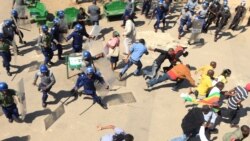Six members of a non-governmental organization, Crisis in Zimbabwe Coalition, on Tuesday met with Namibian president Gabe Geingob, who is the chairperson of the Southern African Development Community (SADC), and urged him to intervene in Zimbabwe to end serious social and economic problems, which they claim may lead to civil unrest.
Rashid Mahiya, chairperson of the organization, says they told Geingob that they are worried about skyrocketing prices of basic commodities, crippling shortages of goods and cash and the militarization of the state, just two months after innocent civilians were gunned down by the Zimbabwe National Army while some suspected opposition supporters were pressing the Zimbabwe Electoral Commission to release results of the July 30 presidential election won by President Emmerson Mnangagwa.
“There is a lot of mistrust. The level of mistrust and polarization in Zimbabwe makes it increasingly difficult for us to move forward as a country, So, we came here to engage with the president, and to engage on these issues. The state of the economy is such that people cannot afford basic services like medication, health, even basics like food … like bread. The cost of bread is going up. The environment as far as we are concerned as Crisis in Coalition is explosive, it is dangerous. It might actually lead to social unrest and we think it is important that SADC puts Zimbabwe on the agenda to avert a complete meltdown.”
He pointed out that the Namibian leader noted that the SADC leaders won’t be able to change the outcome of the July presidential poll.
“His position was clear with regards to elections that as SADC they can only respect what they call the legitimate results which is a product of electoral processes and confirmed by the courts but he concurred with us that there was need for a conversation and dialogue to take place in Zimbabwe for us to solve the crisis.”
Mahiya, who says Geingob may not act swiftly on their concerns due to close relations between former liberation movements - Namibia’s ruling South West African People’s Organization (SWAPO) and President Mnangagwa’s Zanu PF - further urged Geingob to inform some of his ageing colleagues to groom young leaders for the benefit of the African continent.
“… We appreciate the principle of sovereignty of nations so we don’t expect a superman action by the president. We expect him to engage, we expect him to talk to his counterparts.”
He says they are worried about the militarization of the state in Zimbabwe, a situation that was brought to the attention of Geingob. “We also raised with him the issue of the militarization of the state … that the state was highly militarized and made it difficult for citizens to engage with the state.
The Crisis in Zimbabwe Coalition team which wraps up its visit in Namibia on Wednesday, is expected to engage President Mnangagwa, President Cyril Ramaphosa of South Africa, Angolan president Joao Lourenco and President Mokgweetsi Masisi of Botswana about the deteriorating situation in Zimbabwe.
Zanu PF member, Effort Nkomo, says Crisis in Zimbabwe Coalition is wasting its time as there is no crisis in Zimbabwe.
“… In any situation, we have people that want to create a crisis where there is no crisis. In a country like Zimbabwe we have means and ways of solving our own problems. We don’t have to run to another country (to resolve our problems). Those countries have their own problems. We don’t need to add our problems on other people’s problems. Let’s desist from that … These people are just wasting their time.”
He claims that some people are sabotaging Zimbabwe’s economy for their own benefits. “How can you have a situation where someone deliberately withdraws goods from shelves? That’s economic sabotage. If I had my way I would withdraw trading licences for such people.”
Zimbabweans have been struggling of late, following historic inflationary figures between 2001 and 2008, with goods vanishing on shop shelves and prices skyrocketing. Government blames unscrupulous businesspeople for increasing prices and taking off goods for shelves to trade in the black market.
On the other hand, independent economists say the government has no clue to running a vibrant economy.







